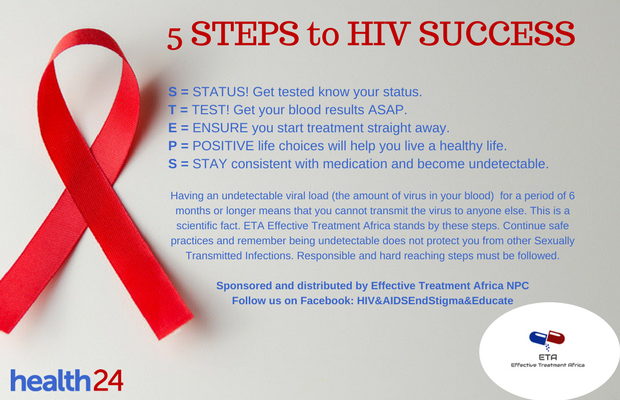
Although much progress has been made with the treatment of HIV over the past three decades, there is still stigma surrounding the virus.
This is the story of how one woman’s diagnosis led to a personal victory – and about her daily battle for a stigma-free, informed platform for HIV positive people.
'I decided that I was going to survive'
Barbara Kingsley was diagnosed on 29 December 2000. She had to be tested at least seven more times as the first tests were inconclusive.
“I got headaches and something felt a bit off. I felt like I had the flu. When I was diagnosed as HIV positive, I was devastated, but made a decision – I decided I was going to survive."
Her family was supportive, but it was a case of the blind leading the blind. “I didn’t know what the future held, nor did they.”
Barbara was fine after her diagnosis. Back in 2000, doctors waited for your CD4 count to drop below 200 before you were started on antiretroviral drugs. Today she stresses how important immediate treatment is: “Start treatment as soon as you are diagnosed!”
The right ARVs made the difference
For the first couple of years after her diagnosis she had her CD4 count tested regularly. “But then I stopped because I felt that I was being negative by getting tested.” In September 2006, her CD4 count was still 300. Eighteen months later was a different story… her CD4 count had dropped to 86.
“It was then that I realised that I was really sick – and only then did I start taking antiretroviral drugs (ARVs)." Unfortunately, she had bad side-effects from the medication. As soon as she changed to a different medication, she started feeling much better. “What if I had waited another six months?
“I urge people who are newly diagnosed to start the ARVs as soon as possible – it truly makes a huge difference. HIV doesn’t have to become this big, scary thing. It can be easily controlled.”

Running for HIV
“After being so ill, I began to run for the first time in my life, eventually going on to successfully complete the comrades marathon in 2013. It required a certain type of mental courage I knew I possessed within myself, the same strength that I drew on to fight for my life.
"I started running – slowly but surely, from lamppost to lamppost. Soon I piled on the kilometres. My first Comrades didn’t go as planned. I developed a stomach bug and was severely dehydrated and my legs seized up at 72km. But I was undeterred. I was back the very next year, and I finished. When I think of getting tired, I think back to the time I was so sick. If I could overcome that fatigue, I could run up a hill.”
On being an HIV ambassador
Not only does Barbara inspire with her personal courage, she is also a spokesperson/ambassador for a non-profit company that she co-founded, called "Effective Treatment Africa". The Facebook page for this company is "HIV & Aids, End Stigma & Educate".
“We also offer a counseling service, because it’s not HIV that kills, but the stigma and the lack of knowledge and resources.
"People are scared of going to their local clinic to pick up their medication in case their neighbours might see them. This stigma causes people to get sicker. But leaving HIV untreated is a hell of a lot scarier! That’s the message I want to convey to people – the positives, the benefits of treatment – those are the things that no-one told me about.
“When your viral load drops below a certain level it's like taking a drop of blood and putting it in the ocean, but when you leave the virus untreated, it’s much more concentrated. This means that when you are on ARVs, there is so little virus left it can’t make you sick – as long as you take your treatment as you should.
"The goal of ARVs is for the virus to eventually become undetectable. This means that if you have an undetectable viral load for a period of six months or longer you cannot pass the virus to others. It is very important to understand that this doesn't protect you against pregnancy or any other STD and that you can practice irresponsible sex — this should be practiced in a monogamous, long-term relationship."
"An undetectable state can ONLY be achieved with ARVs, something that has been scientifically proven and internationally accepted. (It however doesn’t mean that you can now have unprotected sex as you wish.)"
"You need to stop the virus in its tracks. There is no reason not to take treatment.”
Living with stigma
Despite her family's constant support, Barbara still experiences prejudice.
“Even though my family is supportive, I’ve had many people walking away from me, especially when it comes to relationships. People are so caught up in what they believe that it is impossible to educate them. Even when you tell them the facts, they don’t want to know because they choose what they understand. It’s ignorance.
“I often wonder what else I can do. I run ultramarathons, I’m an activist, I speak out. How much further do I have to run to show a person that I’m worthy, that I’m good enough? I have come to understand that I’m more than good enough, that people need to accept me as I am or leave. I do not need anybody’s stamp of approval.”
Barbara says that if someone doesn’t want to accept you despite your status, it’s not worth having them in your life . "If a boyfriend leaves you, he is not worthy of you. Those who love you will stay."
Breaking the stigma
Another thing Barbara stresses is that there are no “symptoms” and “tell-tale signs” to identify someone who is HIV positive. “People often ask what a person with HIV looks like. 'Is there weight-loss; what symptoms will we see?’ I tell them to look in the mirror. HIV can happen to anyone. It’s not a disease of the promiscuous. Think about survivors of rape or someone born with HIV.
“It’s also the way that the media portrays HIV: Articles like ‘How to speak to a person with HIV’, and for example the criteria for blood donation. I query statements like 'To donate blood you have to live a responsible, safe lifestyle'. Ask the woman who was raped at gunpoint if she was living an 'irresponsible and unsafe lifestyle'.
"These are the things that perpetuate stigma. The way to break the stigma is if we each take the responsibility to educate and inform those around us. It starts with everyone around us, with the things we say.”
Barbara also mentions the questions people often ask, like how to talk to someone who’s been infected. “I tell people to talk to them just as you would talk to your mom, your grandma, your friends.”
"I’m lucky enough to be able to be an activist and to have a voice without being attacked or threatened. Only we can change stigma by educating those around us. I don’t just speak for myself, I speak for all of us.
“If everyone took responsibility for themselves – by getting tested, using a condom and disclosing their status, it will make a big difference.”
For more information, like and follow "HIV & Aids End Stigma & Educate" and "Barbara Kingsley HIV" on Facebook.
Photo of Barbara provided by Beautiful News South Africa




 Publications
Publications
 Partners
Partners











